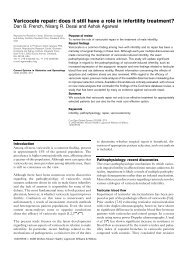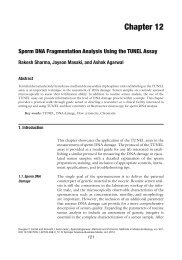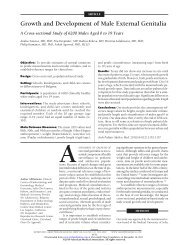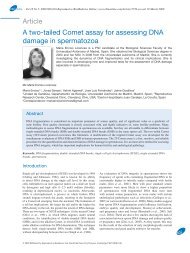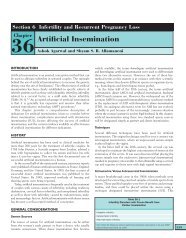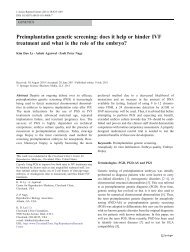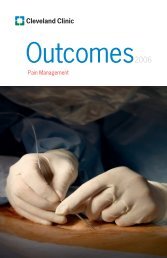onthehorizononthehorizononthehorizononthehorizononthehorizononthehorizononthehorizonthe chemotherapyclockEveryone has an internal clock, a genetictimepiece that controls a broad range ofmetabolic, cellular, physiological and behavioralactivities. Understanding which genescontrol the variations in these daily activitiescould lead not only to new cancer therapies,but also to the <strong>best</strong> time of day to applythose therapies.The concept is simple: If you know whena person is more sensitive to chemotherapy- that is, when less of a toxic chemical isneeded to achieve the same cancer-fightingeffect with fewer physical side effects - drugtherapies can be directed accordingly. Theresult would be to more carefully administertherapies to the time of greater tolerance.Marina Antoch, Ph.D., Cancer Biology, isamong a group of researchers at theCleveland Clinic Lerner Research Instituteand the Howard Hughes Medical Institutewho reported on how the internal clock controlsthe response to one of the widely usedchemotherapeutic drugs - cyclophosphamide.The results were published earlier thisyear in the Proceedings of the NationalAcademy of Sciences.“Within the last eight years, the genesthat govern the circadian system have beenidentified and explored and we’ve madetremendous gains in the area,” saysDr. Antoch. “This is the first link establishedbetween the molecular mechanics of theinternal body clock and the effect of therapeuticdrugs.”Dr. Antoch and her colleagues also willbe investigating biological and medicalpossibilities for “re-setting” a person’s internalclock so that the body will think it’sreceiving therapy during the most effectivepart of its daily rhythm.Turning Off IBD TriggersInflammatory bowel disease (IBD) affects morethan one million Americans. During inflammatoryflare-ups, a hallmark symptom of IBD,erosion of the inner lining of the intestineoccurs, causing bleeding, diarrhea, fever andabdominal pain.Cleveland Clinic researchers Scott Strong,M.D., and Carol de la Motte, Ph.D., with theDepartment of Colorectal Surgery and theDepartment of Pathobiology, want to find a wayto stop the inflammation and erosion processassociated with IBD. To do this, they are focusingon how cell mechanisms within the bowelwork and how they trigger IBD symptoms.Researchers believe that environmentaltriggers, including microbiological agents andviruses, begin the process of inflammation andkeep it going in the intestine of patients whoare genetically susceptible to IBD.Dr. Strong’s team has found that when avirus infects muscle cells in the intestine,the cells will make big, long cables of acompound called hyaluronan. This compoundis essential for the body’s ability to repair itselfand is found in the joints, liver, skin, eyesand intestine.“When these long, complex cables of hyaluronanare produced, white blood cells willcome and sit on them,” says Dr. Strong. “Thewhite blood cells then become activated,releasing their own chemicals, attacking anderoding the interior lining of the intestine.”Although much more research is needed tofully understand this cell mechanism, Clinicresearchers are looking at several options thatwould essentially prevent IBD flare-ups fromoccurring. These options include halting theexcessive production of hyaluronan or promotingthe breakdown of hyaluronan. Anotherpossible option is to interfere with the whiteblood cells that attach to the hyaluronan,preventing the release of chemicals thatperpetuate inflammation.The long green hyaluronan cables attract whiteblood cells, shown here as the round blue balls,which then attach themselves to the cables.42 cleveland clinic magazine
onthehorizononthehorizononthehorizononthehorizononthehorizononthehorizononthehorizonSniffing OutCANCERThe electronic nose, a device long used forsafety and quality control in the food, wineand perfume industries, may also be usedin the future to detect early evidence oflung cancer.Known as the Cyranose, the electronicnose is a hand-sized device that usesbiosensor technology to produce a "smellprint" of the volatile organic compoundsthat comprise human breath and otherairborne compounds.Led by Serpil Erzurum, M.D., Chairmanof the Department of Pathobiology at theCleveland Clinic Lerner Research Institute,researchers speculated that the electronicnose could be used to detect and distinguishbetween lung diseases, particularlylung cancer.Testing their theory, they found theexhaled breath of lung cancer patients hadspecific characteristics that, in fact, couldbe detected with the device. In their study,Cleveland Clinic researchers examined theexhaled breath of 14 lung cancer patientsand 45 healthy patients. The electronicnose was programmed to detect certaincharacteristics in breath and used algorithmsto create patterns viewable on acomputer screen. Researchers found thepattern characterizing the breath of lungcancer patients was distinctly differentfrom that of healthy patients and of peoplewith other lung diseases. Their findingswere published in the American Journal ofRespiratory Medicine earlier this year.“Our work indicates that the electronicnose can be used as a non-invasive tool forthe early diagnosis of lung cancer and tomonitor the effectiveness of treatment onlung cancer patients,” says Dr. Erzurum.The electronic nose could enable physiciansto determine the appropriate coursefor a lung cancer patient’s treatment at anearlier stage, rather than after the cancerhas spread to other parts of the body andis more difficult to treat. The small,portable nature of the electronic nosealso will make it easy to use in physicianoffices and outpatient settings.Tissue Damage Early in Multiple SclerosisMultiple sclerosis (MS) is a debilitating disease that attacksthe brain and spinal cord, resulting in the loss of thinkingability, muscle control, balance, vision and sensation. In along-term research study that focuses on how the diseaseprogresses and how it contributes to theloss of brain tissue over time, ElizabethFisher, Ph.D., a biomedical engineer,and her colleagues have determinedthat permanent damage in the braincan be detected at an earlier stage ofMS than previously thought by usingmagnetic resonance imaging (MRI).Dr. Fisher says these findings couldhelp validate new treatments forMS patients, therapies that could beused to prevent inflammation at a muchearlier stage of the disease and therefore preventearly brain tissue loss.In 1997, Dr. Fisher developed landmark software that providesaccurate measurements of minute changes in the braineven in the early stages of MS. In collaboration with RichardRudick, M.D., and other neurologists at the Cleveland ClinicMellen Center, Dr. Fisher has been following about 60 MSpatients over a period of five to 14 years with MRI exams.“Although we’ve known that the progression of MS is associatedwith inflammation,” says Dr. Fisher, “what we didn’t knowis how and when the inflammation contributes to brain tissueloss.” These inflammatory events attack the myelin, the tissuethat covers and protects the nerve fibers inthe brain and spinal cord. Oftentimes,the patients will recover from theseinflammatory events, especially in theearly stages of the disease.“But because patients usuallyrecover from inflammatory eventsduring the early stages of the disease,it was difficult to determinewhether or not there was residualdamage to the brain,” Dr. Fisher says.“However, when we look at the images,we’re seeing severe damage that results in permanent braintissue loss. We previously thought that the severe residualdamage was a late-stage complication of MS. Now it appearsthe damage is actually happening early on in the disease.”From the same patient, the image left is from 1990 and the image rightis from 1998. With MS, the brain tissue atrophies over time and the fluidfilledspaces, the black areas in these images, expand. This is an extremecase, with a lot of atrophy. A more typical amount of atrophy could not bedetected by the eye, but is now detectable by the measuring softwarecreated by Dr. Fisher.www.clevelandclinic.org 43



